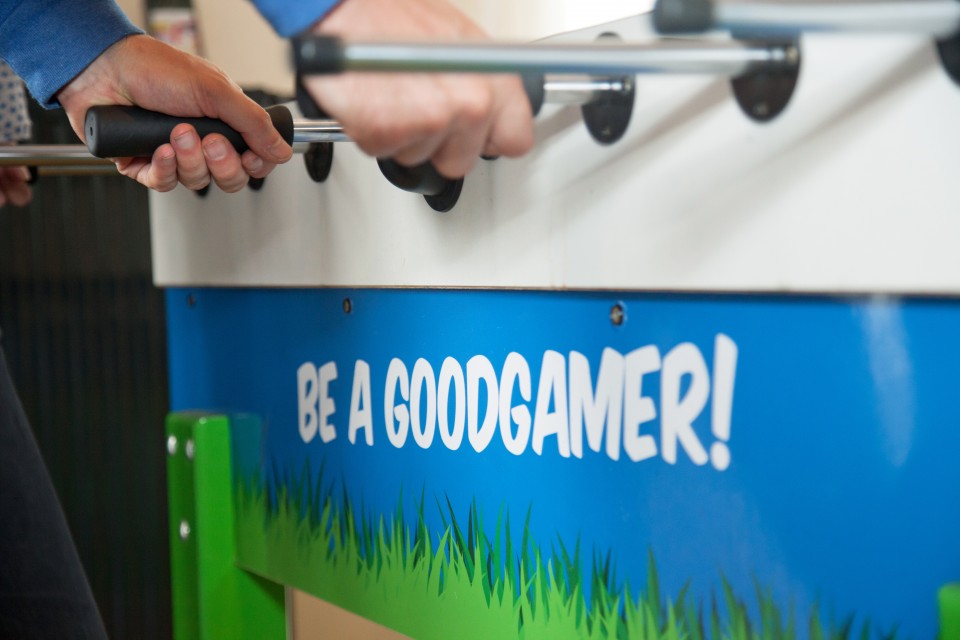With Bioware’s founders having retired, meet the ‘other’ two doctors Kai and Christian Wawrzinek. Together, they are responsible for the highly successful social game studio Goodgame Studios in Hamburg, Germany. Founded back in 2009 and now one of the biggest social game studios in Europe, the Goodgame Studios staff has camped out their massive success and exponential growth at the very same office they started out in.
From Game Portals to Social Games
The brothers started out with their first company together with a friend during college in 2003 and named it after the initials of their last names joined together, thus calling it LWW. Their initial third co-founder later left the company in pursuit of other challenges. “Being entrepreneurs and having our own company has always been a passion of ours,” Christian says. “To do the things you really want to do, while still having fun at work, work together with people you like and be passionate about what you do.”
They earned their first revenue by building websites and by setting up their first game portal a year later. “We figured out first-hand how tough it is to build up a game portal from scratch, so we figured, ‘Why not try to buy another portal?'” LWW went on to acquire their second and third portal with the revenue made from advertisements. “We experienced that it was just slightly easier to build up something just by purchase.”
In the meantime, the brothers were able to finish their studies. Christian studied dentistry and Kai studied law. “We thought it might be good to get all our degrees, just in case our entrepreneurial endeavors wouldn’t go as planned, and we could have a back-up plan.”
They set out to write their business plan, “We really believed we could grow something with what we called ‘website mergers and acquisitions’.” More money was needed to make it work, and so they visited the bank. Though game companies usually don’t get a bank loan, they managed to get one. Even though the bank had no clue about online business, Christian recalls the bank officials saying: “Ok, we trust you. You are a dentist and you are a lawyer, so if things don’t work out, you’ll probably be able to pay all that money back later.”
Christian is proud of their lack of investors in the company, which is very a-typical for companies the size of Goodgame Studios. “Game companies similar to us usually have investors who tell them what to do, and tell them what they think is right or force people to go into completely different directions.”
After investing all of their savings into the company and seeing some good revenue, scaling things up was becoming an interesting prospect. “We didn’t want to go through venture capitalists, because that kind of money is really expensive. The business model that we were doing was very conservative. We bought things that already worked and made them a little better by doubling the revenue, but you wouldn’t expect it to explode.”
When the financial crisis hit that year, the chances of finding alternative sources of funding were becoming slimmer. After some market research, the brothers decided it would be worth the risk to start developing their own games. “We were always very passionate about the gaming field and playing games. Before, we always thought it would be kind of impossible to get into that area. We always had a lot of respect for game developers. I never thought it would be possible to, you know, build up your whole game development company. But because we had some nice steady revenue from the early business model, we gave it a try and then went into the field of developing social casual games.”
It took the team half a year to build the first game and establish the company as a brand, while hiring more developers and also establishing a partner program (which Christian Wawrzinek still attributes a big part of Goodgame’s success to, even today). “We were partly an investment company and partly web guys. We had some programmers: my brother does programming too, and we were kind of experienced in the web area but not in the gaming field. So we had to build up the whole structure in the beginning of 2009.”
The brothers also involved game veteran Simon Butler when setting up the Goodgame brand. He prevented them from making very big mistakes. Although they never shared the same opinion, he made sure not to just agree on everything they wanted. Instead, he would openly just say “No, I think it’s wrong, and I will tell you why.” Having a sparring partner like that is very helpful.
Balancing Creativity and Security
Things really started picking up in 2010: March marked the launch of their second game, Goodgame Farmer, and Goodgame Gangster (originally called Mafia) was made in May, while revenue streams were steadily growing. Production was constantly scaled up during that year, allowing Goodgame to produce 10 titles by the beginning of 2011. The office building that housed Goodgame was slowly but steadily being taken over by the company, with the team reaching over a 100 employees in 2011.
The absence of any investment money in Goodgame forced the brothers to play things as safe as possible in order to not risk the company from going under. “We always did lots of research without being too experimental, because we wouldn’t have been able to afford big mistakes when just starting out.”
Goodgame experimented with different kinds of target audiences for their products, in order to gain experience and apply what they learned. Eventually, analytics became an increasingly important part of their business, leading the studio to develop their first key performance indicators (KPIs), metrics and tracking tools.
The growth spurt that Goodgame went through from 2010 to 2011 is quite common to social game companies making it big with their early titles, but when it came to hiring new employees, they took a different approach. “One of the things that I’ve seen happen a lot is that a company gets a big bag of money from an investor and suddenly, they try to act like a big corporation, with the associated structure,” Christian says. “We were fortunate to see other companies around us grow from small to big in a really short period of time and what consequences it brought, like the employees becoming really unhappy. We found that out pretty easily because sometimes we would get waves of new applications from these employees.”
Noticing this pitfall, Goodgame recently invested in a Goodgame Café area in their offices, where they frequently host events, making sure their growing team (about 500 employees at the moment) gets an opportunity to mingle and meet coworkers from all over the ever-growing studio. “We think this internal mingling is very important, because we want a programmer from one department and a designer from another department (even though they don’t work together directly) to come together and have a beer with a sales girl at the end of the day and catch up on what they’ve all been doing.”
Christian offers a few pointers for other companies that are going through a rapid growth process like Goodgame. “First of all, listen to your key employees and acknowledge what they think about the general climate inside the company,” he advises. “Give them some things that they can hold onto and provide them with some responsibilities that are gratifying, but always make sure to listen to them. The second thing would be to manage decision-making processes. As you grow your team to 30 or 40 people or so, the point comes when taking all the decisions yourself just isn’t possible anymore. From that time on, you have to put a really big focus on your intermediate management team.”
“I think it’s inevitable that you have some, as I would call it, growth-ache or so,” Christian admits. “Things change all the time when you grow fast, and some things will inevitably come up that people don’t like. But you have to anticipate that and know how to appropriately respond to it. You have to demonstrate strong leadership and let them know that you’re listening and reacting accordingly.”
Calculated Growth
Though currently still on a giant hiring spree (with over 100 job positions open), the company has reached over 500 employees. But Goodgame wants to avoid as many obstacles and challenges that come with that kind of rapid growth. “From all applications, we only select 2 percent” says Olliver Heins, Head of Games. “We really focus on getting people that are experienced and fit within our plan and the team itself. You often see a lot of hires in the game business that center around personal contacts, but that doesn’t often guarantee a great chemistry and fit inside the bigger picture.”
Having worked at Bigpoint in the company’s earlier days, Heins has had a front row seat and seen how the Hamburg-based company grew fast and opened multiple offices around the world. Upon joining Goodgame Studios in the summer of 2011, Heins had a bit of a hard time adjusting to the atmosphere of a beginning company and the structure the Wawrzinek brothers had set up. “Everything felt small again for me after Bigpoint; travel budgets were limited, and teams were small again. It really was like going back in time and seeing how Bigpoint was years ago.”
But this also made Heins a valuable asset to Goodgame, being able to foresee the challenges of rapid expansion. “I was amazed at how much Goodgame was being driven by research and analytics. We have great analytics tools to work with that allow me to quickly see everything that is happening. The focus on driving revenue and business definitely is something I enjoy here.”
Since our last visit to Goodgame Studios, they have successfully released their first mobile app called Empire: Four Kingdoms, which at one point reached the iOS and Android top 10 grossing charts. Christian has since then also announced the studio’s desire to be amongst the top 20 biggest game companies in the world, taking on the likes of Electronic Arts and Ubisoft. They hope to achieve this goal by the year 2020.








